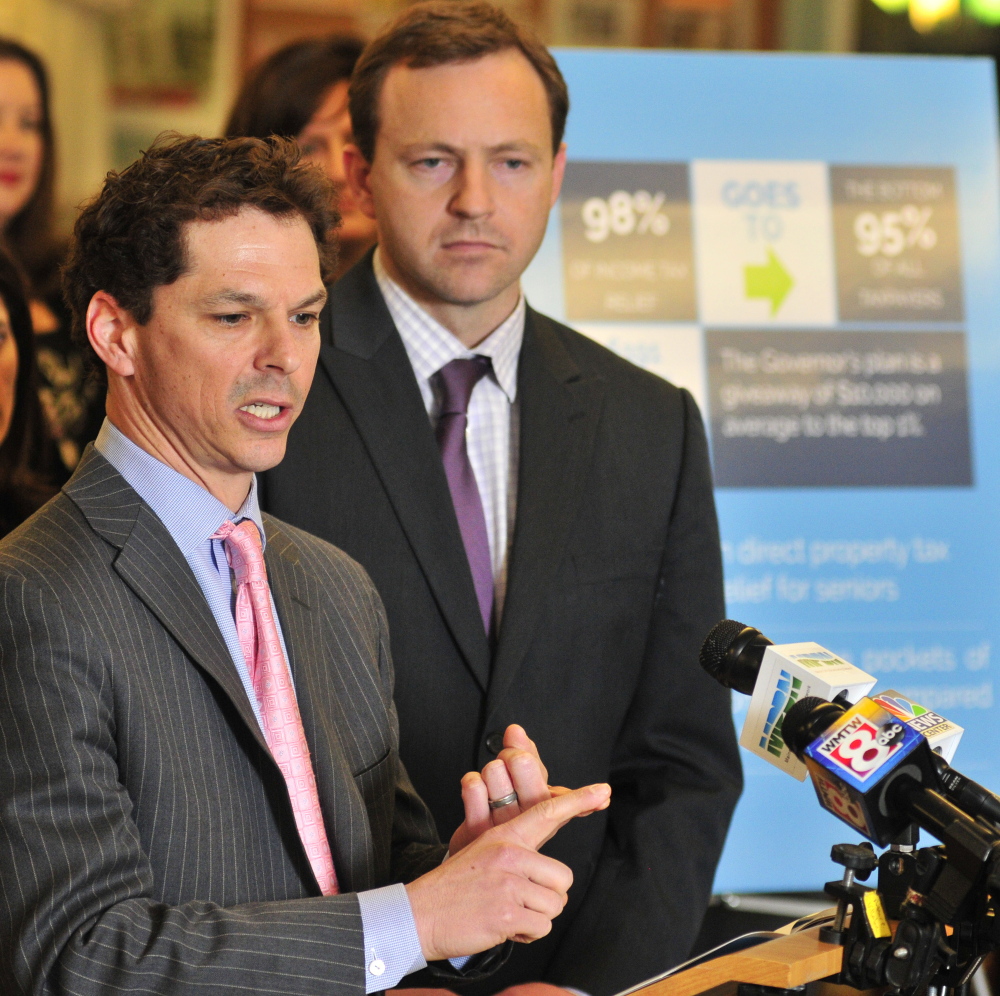Gov. LePage shocked Maine’s political world this year when he rolled out his budget proposal, which calls for a major overhaul of the state’s tax system.
It was no surprise that LePage called for massive income tax cuts – he promised as much in his successful re-election campaign. But no one predicted that the governor would also want to modernize the sales tax by getting rid of many exemptions, as well as raising the rate. And while his proposal to eliminate municipal revenue sharing had been anticipated, his proposal to replace it with a property tax on nonprofits was something that had been on no one’s agenda.
Legislative Democrats finally rolled out their response last week. It took a while, but it was worth the wait. It is just as comprehensive as the governor’s proposal and sets the stage for a meaningful debate on the best way to pay for state services. It incorporates the best elements of the governor’s plan, while it differs in ways that would strengthen the economy. This is a good place to start the debate.
Like the governor, the Democrats’ plan addresses all three sources of revenue for state and local government: income tax, sales tax and property tax. In each case, we think the Democrats have the better approach.
INCOME TAXES
While both plans cut income taxes, the Democrats focus their relief on the middle class. Gov. LePage drops thousands of lower-income Mainers off the tax rolls, but the majority of the relief he offers goes to top earners. He gives half of his tax cuts to the top 5 percent of incomes. The Democratic plan delivers 98 percent of its tax relief to the bottom 95 percent of taxpayers.
The governor argues that the cuts in the top rates are necessary to put more money in the hands of “job creators,” but taxes are low on the list of the factors businesses consider when they expand or move. It has been proven to be much more effective to put money in the hands of consumers who will spend it. That boosts demand and leads to economic growth.
SALES TAXES
The two plans are the most similar regarding the sales tax. The Democrats adopt the governor’s proposed elimination of sales tax exemptions for services, but instead of raising the rate to 6.5 percent, they would keep it at the current 5.5 percent. Their plan also adopts the governor’s idea of a refundable sales tax credit for low-income filers, in order to make the increase in this levy less of a burden for people who pay a higher percentage of their income on sales tax.
In order to boost the proportion of the sales tax collected from visitors, the Democrats would tax meals and lodging at 8 percent, which would still be among the lowest rates for a tourism-dependent state.
PROPERTY TAXES
The most critical difference between the two plans is how they approach the property tax.
Democrats would double the homestead exemption for resident homeowners, where LePage would eliminate the exemption for anyone under the age of 65. The Democrats would increase municipal revenue sharing, which LePage would eliminate. The Democrats would reject the LePage proposal to allow municipalities to tax nonprofits, like hospitals.
We see the property tax as an area where there is a place to meet in the middle. Revenue sharing can lower property tax rates, but it lowers them for everyone. Targeting tax relief to individual residents allows them to pay less while businesses and the owners of second homes pay more. For a state in which so much prime property is owned by people from away who don’t pay Maine income tax, targeted property tax relief makes the most sense.
The Democrats’ proposal gives shape to the debate ahead. Instead of talking about whether to cut income tax, the discussion will be about whose taxes to cut. Instead of talking about whether to expand the sales tax, the discussion will be about how far. Instead of talking about property tax relief, the discussion will be about the best way.
This debate would not be happening if Gov. LePage had not upset the political world with his bold proposals, which, in many ways, defy typical right-left categorizations. He deserves credit for starting the conversation, but where it ends up will be up to a bipartisan majority in both houses of the Legislature.
If they can make a deal, Maine could finally modernize its tax system, which would be the biggest surprise yet.
Copy the Story LinkSend questions/comments to the editors.



Success. Please wait for the page to reload. If the page does not reload within 5 seconds, please refresh the page.
Enter your email and password to access comments.
Hi, to comment on stories you must . This profile is in addition to your subscription and website login.
Already have a commenting profile? .
Invalid username/password.
Please check your email to confirm and complete your registration.
Only subscribers are eligible to post comments. Please subscribe or login first for digital access. Here’s why.
Use the form below to reset your password. When you've submitted your account email, we will send an email with a reset code.